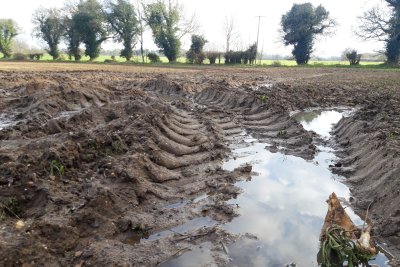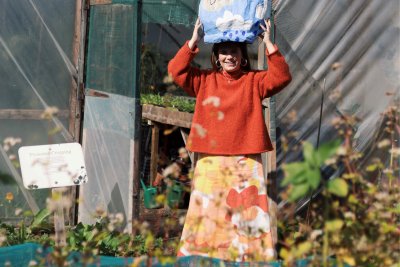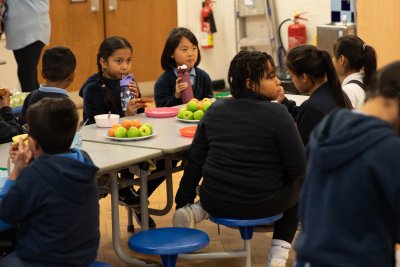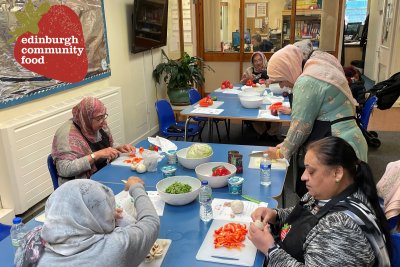European trials seek to rebalance food costs at either end of the supply chain
Two European trials are seeking to tackle the challenge that Sustain's Bridging the Gap programme seeks to address - what we can do to make sustainable food affordable to all. What can we learn from the different approaches? asks Hannah Gibbs
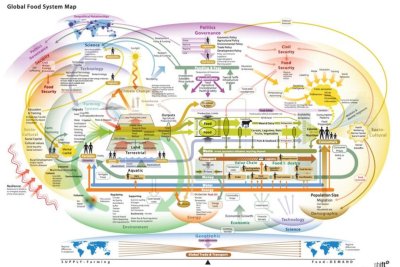
In a recent edition of BBC Radio 4’s The Food Programme, producer Dan Saladino posed the question of whether the global food system is 'too big to fix'. Certainly, if you take a look at the hugely complex diagram, this feels like a reasonable conclusion. At Bridging the Gap we believe that we have to try, and we find ourselves inspired by national and international movements demonstrating how this could be done.
Funded by the National Lottery Community Fund, the Bridging the Gap programme is exploring ways to enable people on low incomes to access climate and nature friendly food. The programme will run pilots across the four UK nations to demonstrate what might be possible with government intervention. The pilots will be based around six approaches to bridge the gap that we have coproduced with people working in food and farming. The evidence from the pilots will then be used to advocate for urgent national and local level policy change.
Two examples of trials in Europe have caught our attention, tackling different ends of the challenge that Bridging the Gap seeks to address. The first, a German supermarket charging the true climate cost of food, and the second, French and Belgian organisations introducing social security for food.
These trials, viewed together, beg the question: can we hope for a future where paying for the true cost of food might lead to the “health-giving supply chains that are good for people, farmers, and the planet” that Vicki Hird, Sustain’s Head of Sustainable Farming, called for in a recent article.
The true cost of food
In July 2023, the Penny Supermarket, a leading discount supermarket in Germany, ran a week-long experiment across all of its 2,150 branches, which raised the price on a range of products to reflect their impact on climate and on people’s health. In one example, cited in an article in The Guardian, a popular cheese rose in price by 94%, due to scientists calculating the hidden costs of:
- Climate-harming emissions: 85 cents
- Soil damage due to intensive farming and animal feed production: 76 cents
- Impact of pesticide use, including on farmer health: 63 cents
- Pollution of groundwater through fertiliser: 10 cents
In an interview with German media, the supermarket’s chief operating officer Stefan Gorges said, “We need to put out the uncomfortable message that the prices of our foodstuffs which are accrued along the supply chain in no way reflect the environmental on-costs.”
The UN Food and Agriculture Organisation debated true cost accounting at the recent Food Systems Summit in Rome, a potential mechanism for managing hidden environmental and health-related costs, for example through taxes, subsidies and regulations, to deliver a food system that keeps within planetary boundaries.
In Switzerland, the government is exploring how it might redesign and repurpose public policies and support to make the necessary transformation to the food system. Speaking on the Radio 4 Food Programme, Alwin Kopse of the Swiss Federal Office of Agriculture described a 'true cost of food' policy currently in development and intended to launch within five years: “We need to be able to address true costs in a more complete way. Measures could be incentivising mechanisms, so either you tax bad behaviour or incentivise good behaviour.” But they also made clear that any such change would need to enable access to this food to all citizens: “One thing we need to be to be really careful about is affordability of food… True cost accounting should not lead to higher prices for healthy and sustainably produced food… We need to look at the entire system… and make bad food more expensive.”
Social security for food
In France and Belgium, a group of eleven civil society organisations are exploring how this affordability gap can be bridged. They propose that a budget of 100-150 euros for adults and 50-75 euros for children, be added to every citizen’s social security budget to purchase food products that meet certain criteria, such as organic certification, short supply chains and fair pay for farmers and workers.
The initiative, being trialled for a year in Montpellier and Brussels, aims to give everyone equal access to quality food that is good for their health and the health of the planet. The proposed policy would be funded through taxation, which in turn would be augmented through taxes on unhealthy products. Jean-Francois Neven, an attorney of labour and social law, has shown that a policy of this nature is both legally and institutionally possible, but comments that this would require great political will to achieve.
En Marché!
As Dan Saladino points out, there are plenty of great ideas and initiatives being worked on globally, the question remains whether they will be implemented and whether policymakers will take up this challenge at the speed our health and climate emergencies require.
At Bridging the Gap, we aim to explore what raft of measures we might promote in a UK context to ensure access to healthy, climate and nature friendly food for all, by running our UK-based pilots to understand what works in our context. We look forward to learning from the evidence our European colleagues gather as we build our approaches to Bridging the Gap here in the UK.
If you would like to get involved or share anything you are doing relating to Bridging the Gap contact bridgingthegap@sustainweb.org
Read about the six areas of focus Bridging the Gap is exploring.
Published Thursday 31 August 2023
Bridging the Gap: Bridging the Gap to climate and nature friendly food for all.
